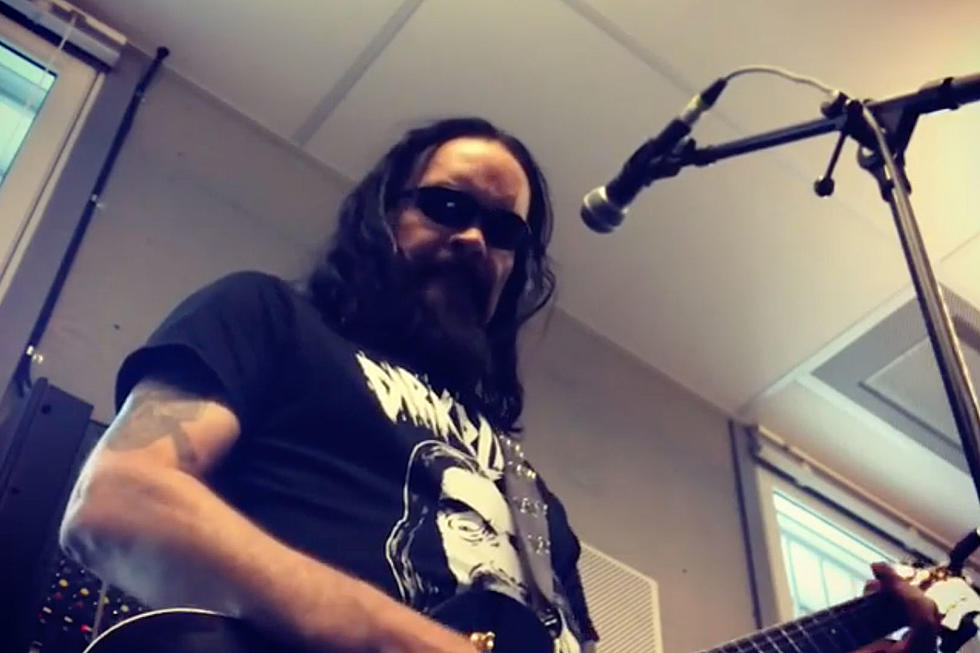
America’s Difficult Visa Process and What It Means for Foreign Artists: Satyricon Sound Off
On the very same day that Slayer announced that they will hang up their inverted crosses and pentagrams for good, Satyricon revealed that they, too, will say a goodbye of their own. The Norwegian metal band isn't retiring, but they have announced their next U.S. tour will be their final headlining visit here and it isn't because they don't want to play to American fans.
For decades, touring the United States has proven to be a challenge for foreign bands who are not yet at the superstar level; arena-headliners like Iron Maiden and Judas Priest are able to tour here and make a profit. But for foreign bands who play small theaters and clubs, it's a trickier proposition. Often, these bands nearly drown in a sea of excessive paperwork required to gain entry into the country as touring musicians. The stateside system presents more hurdles than artists encounter in most other parts of the globe, and the painstaking process has led Satyricon's principal members, Satyr and Frost, to decide to embark on one last headlining U.S. tour.
Several bands with American fans rarely reach our shores due to diplomatic red tape. Frequently, members have been denied entry to the U.S. due to complications with visas, either because the complex paperwork was not filed properly or because the visas did not arrive in time. Often, criminal records, even for seemingly negligible offenses, have prevented members from being allowed in, like Satyricon's own Frost. This has left entire tours in limbo as the bands scramble to secure last-minute fill-in musicians to ensure that tours are not canceled. Too often, though, they are.
To further understand what led Satyricon to abandon the U.S. touring market after this final run, we spoke with frontman Satyr, who confirms that organizing a stateside jaunt is as insanely arduous.
“You just have to book the tour and hope everything goes well or else there will be no tour at all.”
“It’s not because black metal is not big and important like it is in Europe. It’s not because flights are too expensive,” Satyr affirms, noting that black metal has a strong fanbase in the U.S. and that a tour could certainly justify the cost of Transatlantic flights. In order to tour the country, a band can’t begin to apply for work visas until they have a touring contract, whereas, in the past, the visa applications were filed and once a band learned they were permitted to tour America, then the dates would be booked. Now, however, it’s a complete gamble; a game of chance and luck.
“They say that we're not even going to look at [the visas] unless you have a contract saying you are indeed playing there. Then when we go back and say, ‘How can we sign a contract with someone if we don’t even know if you’re going to give us the permits to perform?’ Then they tell you that is your problem, not [theirs],” Satyr says in frustration. “You just have to book the tour and hope everything goes well or else there will be no tour at all.”
"To be treated as if you are a suspicious person with an agenda and that you have to prove that you're not out to hurt the United States in any way is very frustrating.”
Ever since the events on 9/11, American airports seem to be a battleground frontline where the fight against terrorism and tireless pursuit of security has no end. Learning that the process was once easier would lead one to believe a sort of switch had been flipped, but Satyr explained that this change was gradual and not administration based. “It was tough under Bush, it was tough under Obama and it’s tough under Trump. I think some of these government offices run their own ship independent from whatever administration is in charge,” he posited.
Further complicating matters is the nature of Satyricon’s band setup. Satyr and drummer Frost are the sole two full-time members of the group, leaving them to rely on touring musicians to round out their lineup. The Norwegian group enlists four additional members when on the road, which presents an entirely different set of visa hurdles.
A P-1 visa gives license to groups to enter the country for performance reasons, but the language is tricky as the band must be able to prove they have “outstanding” international recognition and that this success must be “sustained for a substantial period of time,” but these parameters are inherently ambiguous. This visa is also for “essential” members only and each member must be with the band for at least one year. Theoretically, if Satyricon are hitting the road with a musician who is brand new to the touring lineup, that musician’s visa may not be granted.
“I've spent much more time on all the paperwork and admin on this forthcoming U.S. tour, which is three weeks more than I've spent on everything else we're doing, which includes two full European tours a forthcoming tour in Japan and Australia. Visits to Russia, and even Israel and believe me, security is tight in Israel and there is a reason for it.”
Satyr explained that items such as press clippings can provide insight into how “essential” this member is, but “typically your live rhythm guitar player is not mentioned in a live review,” he states with dejected sarcasm. “So what should we do? Then [we have to] provide rooming lists from hotel or tour itineraries where their names are listed and you start thinking to yourself, ‘Is this a joke?’”
The law is written this way to protect working musicians in America, ensuring they do not lose opportunities to musicians from overseas. This may be of some benefit if, say Bruce Springsteen was to recruit an entirely European backing band for a lucrative U.S. tour, but it would appear that more often than not, it harms the touring market overall in metal’s case, and, in particular, the underground, where merely breaking even financially is considered an absolute success. “That is my goal — to break even,” asserts Satyr.
Even if a band does not employ a stateside session musician, a tour by a European mid-level metal band still contributes to the U.S. economy. “While you are there, you will be renting gear from American companies and you'll be renting tour buses from American tour bus companies and you will be using the services of America merchandise companies,” he details. “You're also leaving a lot of money in the country that you are performing in. Then to be treated as if you are a suspicious person with an agenda and that you have to prove that you're not out to hurt the United States in any way is very frustrating.”
“If some band wants to bring us over there and there's machinery in the future willing to pay for all of this to be organized on our behalf, sure I'm happy to come back and tour the U.S."
When the band lines up another U.S. run at a later date, the slate is wiped clean and the process begins anew, consuming time and energy from the band and its support staff. “I've spent much more time on all the paperwork and admin on this forthcoming U.S. tour, which is three weeks more than I've spent on everything else we're doing, which includes two full European tours a forthcoming tour in Japan and Australia. Visits to Russia, and even Israel and believe me, security is tight in Israel and there is a reason for it.”
When pressed about the differences between the application process in the U.S. and other countries around the world, Satyr explained that it’s as simple as filling out some light paperwork at the respective embassies. “They want to know who you are and what you will be doing that and when you plan to leave, and that's it really.”
He concedes that it isn’t his place to criticize the system the U.S. has in place. “I can honestly say that if it wasn't for the fact that I know that there's still a lot of people in America that love our music and wholeheartedly support Satyricon, I would have called this off a long time ago. But, I said 'Okay, instead of giving up on something that we all really spent a lot of time on, let's do it and try and break even and then let this be our last headlining tour of the United States.'”
There’s still a wedge keeping that door from closing entirely though. “If some band wants to bring us over there and there's machinery in the future willing to pay for all of this to be organized on our behalf, sure I'm happy to come back and tour the U.S.,” he says with optimism, alluding to the notion that other artists with greater assets have more manpower to make efforts like these less exhaustive. But realistic expectations cut this pipe dream down. “It is highly unlikely for that to ever happen. Secondly, no one has ever offered me something like that - I really wholeheartedly think that this will be it.”
If it is, then America’s laws have worked against the benefit of the country, both economically and culturally. So the next time you’re upset when a band axes an American tour, remember they’re probably more frustrated about it than you are.
Grab your copy of Satyricon's latest record, 'Deep Calleth Upon Deep' at the Napalm Records webstore and follow the band on Facebook. The band's American farewell kicks off on May 13 and you can see the full itinerary below. Support will come from Goatwhore.
Satyricon 2018 North American Tour Dates
May 13 - Los Angeles, Calif. @ The Regent Theater
May 14 - Oakland, Calif. @ Oakland Metro Operahouse
May 15 - Portland, Ore. @ Bossanova Ballroom
May 16 - Seattle, Wash. @ El Corazon
May 18 - Denver, Colo. @ Marquis Theater
May 19 - Kansas City, Miss. @ The Truman
May 20 - Joliet, Ill. @The Forge
May 21 - Columbus, Ohio @ Al Rosa Villa
May 23 - Toronto, Ontario @ The Opera House
May 24 - Montreal, Quebec @ Corona Theatre
May 25 - New York, N.Y. @ Gramercy Theater
May 26 - Baltimore, Md. @ Maryland Death Fest
May 28 - Dallas, Texas @ Gas Monkey Bar & Grill
May 29 - Houston, Texas @ White Oak Music Hall
May 30 - Austin, Texas @ Come and Take it Live
Top 30 Black Metal Albums of All Time
More From Loudwire









